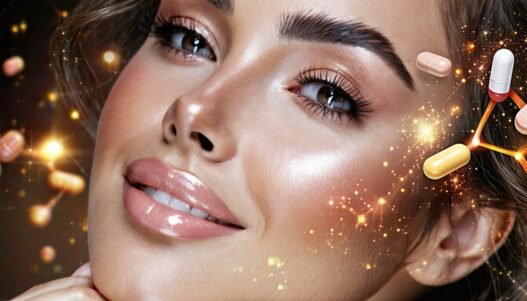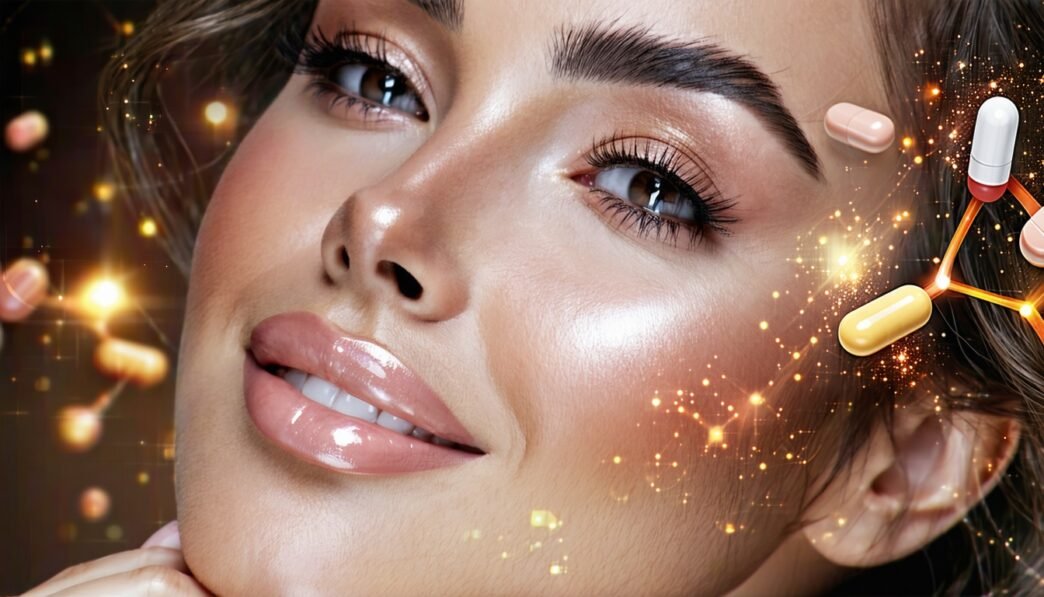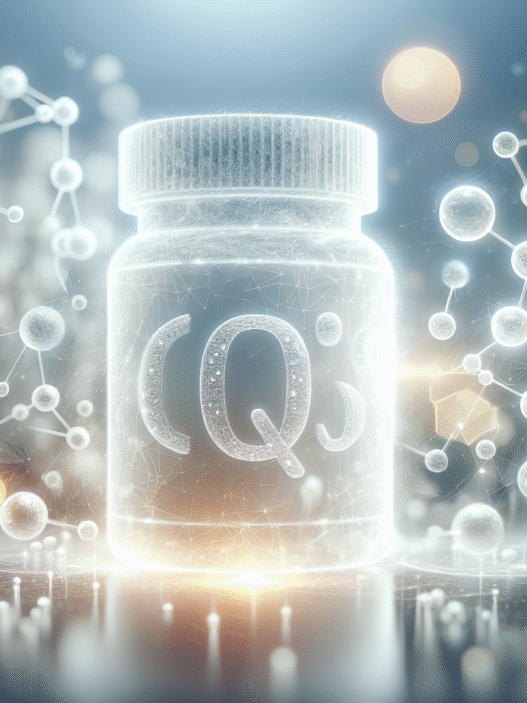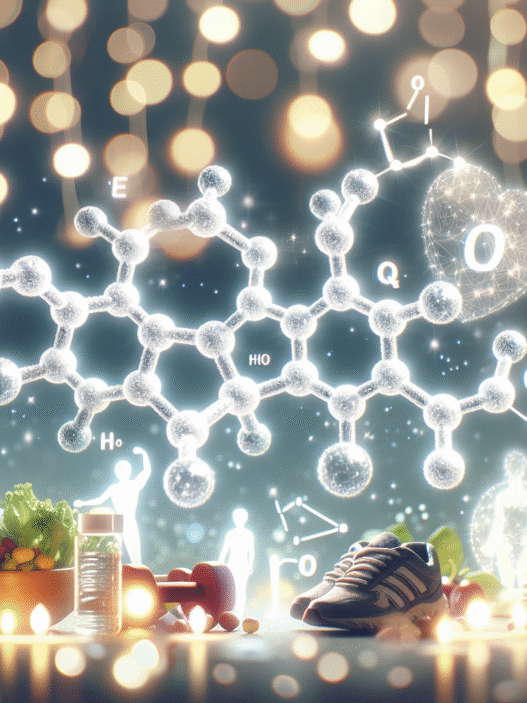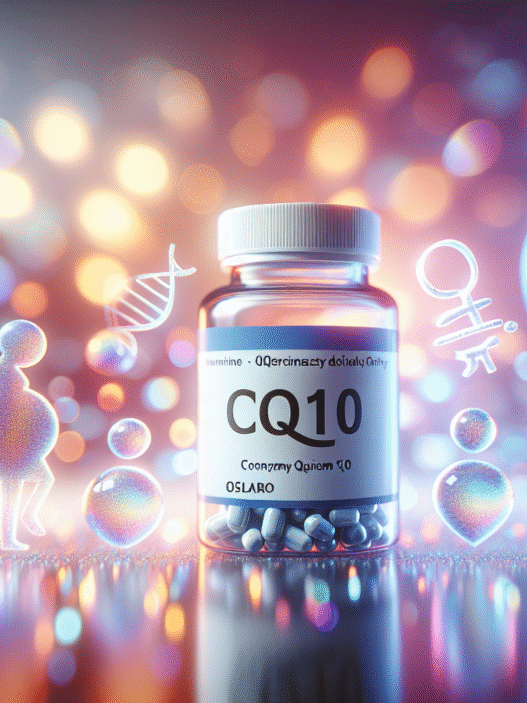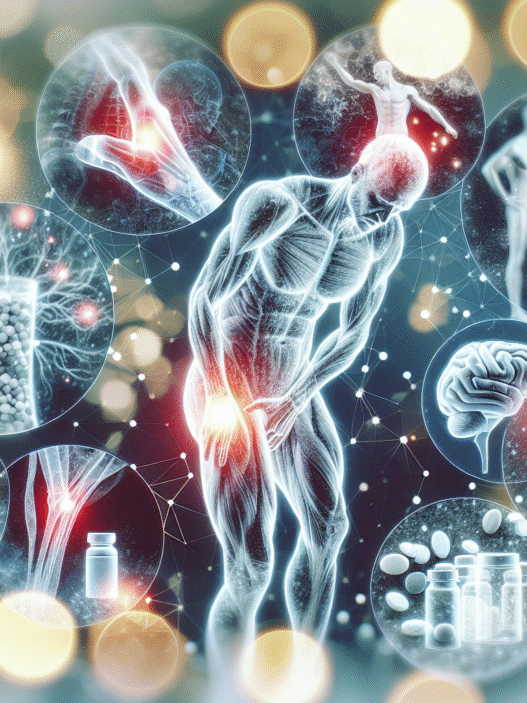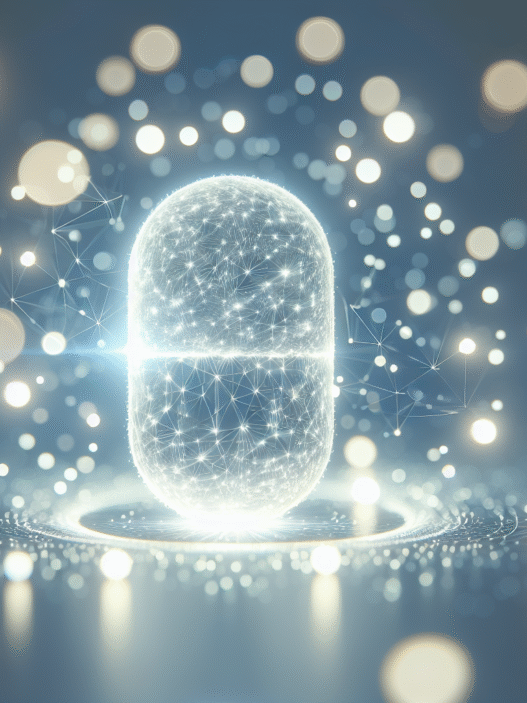Understanding CoQ10
Role of CoQ10 in Skin Health
Coenzyme Q10 (CoQ10) is a compound that plays a crucial role in maintaining healthy skin. Known also as ubiquinone, this lipid-soluble molecule is naturally present in the body, aiding in cellular energy production and functioning as a potent antioxidant. Its significance extends especially to aging skin, where it offers multiple benefits.
CoQ10 levels in the skin naturally decrease with age and exposure to ultraviolet (UV) radiation. The declining levels correlate directly with visible signs of aging, such as wrinkles and reduced skin elasticity. The antioxidant properties of CoQ10 help to neutralize harmful free radicals generated during energy production. Free radicals are unstable molecules that can cause significant cellular damage, leading to premature aging and other skin issues.
CoQ10 also supports the synthesis of collagen and elastin, two crucial proteins essential for maintaining the skin’s structure and elasticity. Collagen promotes skin firmness, while elastin enables it to stretch and regain its shape. Therefore, CoQ10’s role in supporting the production of these proteins leads to healthier and more youthful-looking skin (NIVEA UK).
Topical application of Coenzyme Q10 (CoQ10) has been shown to contribute to increased proliferation of fibroblasts, mRNA expression of collagen, elastin, and heat shock protein 47, as well as protection and stabilization of mitochondrial function against UV irradiation. CoQ10 also inhibits MMP (matrix metalloproteinase) expression and collagen degradation, indicating its anti-aging properties.
CoQ10’s ability to reach the vital layers of the skin and promote energy metabolism is a crucial aspect of its benefits. Once inside the skin cells, it can be converted into ubiquinol, another potent antioxidant that protects the skin from oxidative damage.
| Function | Impact on Skin |
|---|---|
| Antioxidant Protection | Neutralizes free radicals, protects skin cells |
| Collagen and Elastin Synthesis | Promotes skin firmness and elasticity |
| Cell Proliferation | Boosts fibroblast activity and gene expression |
| Mitochondrial Stabilization | Protects against UV damage, maintains cellular health |
To explore the benefits of CoQ10 for skin and understand how it compares with other anti-aging agents like retinol, or to discover CoQ10 skincare products, consider visiting our detailed guides on those topics. By incorporating CoQ10 into your skincare regimen, you can take a significant step towards combating the signs of aging and maintaining vibrant, youthful skin.
Benefits for Skin
Coenzyme Q10 (CoQ10) offers numerous benefits for skin health, making it a popular ingredient in anti-aging skincare. This section will focus on its antioxidant properties and its role in promoting collagen and elastin synthesis.
Antioxidant Properties
CoQ10 acts as a potent antioxidant, helping to neutralize harmful free radicals generated during energy production (NIVEA UK). By combating oxidative damage, CoQ10 helps protect skin cells from premature aging and other skin issues.
| Property | Benefit |
|---|---|
| Neutralizes Free Radicals | Protects skin cells from damage |
| Reduces Oxidative Stress | Minimizes aging signs like wrinkles |
| Boosts Cellular Energy | Enhances overall skin health |
For more detailed insights, check our article on coq10 and free radicals.
Promotion of Collagen and Elastin Synthesis
CoQ10 supports the synthesis of collagen and elastin, key proteins involved in maintaining the skin’s structure and elasticity (NIVEA UK). Collagen is vital for skin firmness, while elastin enables the skin to stretch and regain its shape.
| Protein | Function | Impact of CoQ10 |
|---|---|---|
| Collagen | Promotes skin firmness | Supports production |
| Elastin | Enhances skin elasticity | Boosts synthesis |
For more information on the anti-aging benefits, visit our article on coq10 anti-aging properties.
Studies have shown that applying CoQ10 topically can significantly improve skin roughness, wrinkle depth, and elasticity, particularly in areas with more delicate skin like the neck and hands.
Explore our other related topics:
By harnessing the antioxidant properties and promoting protein synthesis, CoQ10 provides a dual-action approach to enhancing skin health and combating the signs of aging.
Cellular Repair and Anti-aging
Coenzyme Q10 (CoQ10) plays a pivotal role in cellular repair and anti-aging, especially for individuals aged 35 to 65 who are concerned with maintaining their vitality and youthful appearance.
Cell Health Maintenance
CoQ10 aids in cellular maintenance by ensuring that cells function optimally and recover efficiently from damage. It accomplishes this by acting as an essential cofactor for mitochondrial enzyme pathways, leading to increased cellular respiration. This increase is crucial for cellular energy production, which declines as we age. By preserving mitochondrial energy generation, CoQ10 helps prevent skin aging at the cellular level.
The benefits of CoQ10 for cell health include:
- Enhanced Cellular Repair: CoQ10 facilitates the repair processes of skin cells exposed to environmental stressors like UV radiation and pollution.
- Mitochondrial Function: CoQ10 supports mitochondrial health, boosting energy levels within cells.
To explore more about the importance of cellular health and CoQ10, visit our page on coq10 and cellular health.
UV Damage Protection
One of the critical functions of CoQ10 in skincare is its ability to protect against UV damage. UV radiation is a significant contributor to premature skin aging, causing oxidative stress, DNA damage, and the degradation of skin components like collagen and elastin.
How CoQ10 Protects Against UV Damage:
- Antioxidant Activity: CoQ10 is a powerful antioxidant that neutralizes free radicals produced by UV exposure. This reduces oxidative damage and helps maintain the integrity of skin cells (Nature).
- Collagen and Elastin Preservation: Studies show that CoQ10 contributes to the increased proliferation of fibroblasts and the expression of collagen and elastin genes. This implies that CoQ10 not only protects but also enhances skin’s structural proteins, maintaining its firmness and elasticity (Journal of Clinical and Aesthetic Dermatology).
| Benefit | Mechanism | Source |
|---|---|---|
| Reduces oxidative stress | Neutralizes free radicals | Nature |
| Maintains collagen and elastin | Promotes gene expression of structural proteins | Journal of Clinical and Aesthetic Dermatology |
Applying CoQ10 topically can further bolster the skin’s defense against UV damage and support its natural repair mechanisms. For more detailed guidelines on using CoQ10 in skincare routines, visit coq10 and skin rejuvenation.
CoQ10’s protective and reparative roles underscore its importance in anti-aging skincare. By maintaining cell health and protecting against UV damage, CoQ10 not only enhances the skin’s youthful appearance but also supports its overall health. To learn more about CoQ10’s anti-aging properties, check out our page on coq10 anti-aging properties.
Topical Application
Effectiveness in Skincare Products
The topical application of Coenzyme Q10 (CoQ10) in skincare products has garnered significant attention for its effectiveness in addressing various skin concerns. CoQ10 is commonly included in serums, creams, and lotions, offering multiple benefits such as reducing the appearance of fine lines and wrinkles, promoting collagen production, maintaining skin elasticity, and enhancing overall skin health (NIVEA UK).
According to a study published in the Journal of Clinical and Aesthetic Dermatology, the topical application of CoQ10 increases the proliferation of fibroblasts, mRNA expression of collagen, elastin, and heat shock protein 47. Moreover, it stabilizes mitochondrial function and offers protection against UV radiation. This contributes to its powerful anti-aging properties by inhibiting matrix metalloproteinase (MMP) expression and preventing collagen degradation.
In clinical studies, a CoQ10-based skincare product demonstrated improved antioxidative status and anti-aging effects within one to two weeks of consistent use. Notable outcomes included increased skin hydration, reduced wrinkle depth, and enhanced skin elasticity.
| Benefit | Improvement* (%) |
|---|---|
| Skin Moisturization | 15% |
| Reduction in Wrinkle Depth | 20% |
| Increase in Elasticity | 18% |
*Two-week application of CoQ10-based skincare products
Comparison to Retinol
Retinol is a popular ingredient renowned for its anti-aging benefits, such as promoting cell turnover, reducing wrinkles, and improving skin texture. However, it can be harsh on the skin, potentially causing irritation, dryness, and sensitivity. For those seeking a gentler alternative, CoQ10 offers a viable option.
Unlike Retinol, CoQ10 provides comprehensive skin health benefits with minimal risk of irritation. It offers protection against oxidative stress, supports collagen synthesis, and complements the effects of Retinol when used together (NIVEA UK).
Moreover, CoQ10 can effectively reach the vital layers of the skin to promote energy metabolism and produce ubiquinol, a potent antioxidant that shields the skin from oxidative damage.
In summary:
| Factor | CoQ10 | Retinol |
|---|---|---|
| Reduces Fine Lines & Wrinkles | Yes | Yes |
| Promotes Collagen Production | Yes | Yes |
| Protects Against Oxidative Stress | Yes | No |
| Risk of Irritation | Low | High |
| Suitable for Sensitive Skin | Yes | No |
For a comprehensive look at the best CoQ10 supplements and their coq10 benefits for skin, or to explore products and tips for youthful skin, visit our dedicated sections on CoQ10 skincare.
Research Findings
Studies on Skin Aging
Research underscores the profound effects of Coenzyme Q10 (CoQ10) on skin health, specifically its anti-aging benefits. CoQ10 is an endogenous molecule pivotal in cellular energy metabolism and has robust antioxidant properties (Journal of Clinical and Aesthetic Dermatology). Topical application of CoQ10 has been shown to mitigate signs of skin aging by stabilizing mitochondrial activity and neutralizing free radicals and oxidative species.
Reduced levels of CoQ10 in the skin are associated with oxidative stress, mitochondrial dysfunction, and cellular senescence in dermal fibroblasts. These factors contribute to the disruption of cellular homeostasis and are linked to age-related metabolic alterations.
Studies have demonstrated that topical CoQ10 significantly increases its levels on the skin surface and within the deeper epidermal layers, indicating effective absorption and enhancement of cellular energy metabolism.
Results of Clinical Trials
Various clinical trials have affirmed the anti-aging benefits of CoQ10 in skincare products. One particular study noted significant improvements in skin roughness, wrinkle depth, and elasticity when using CoQ10-infused products. The areas showing the most improvement included the neck, dorsa of the hands, and forearms, demonstrating the molecule’s broad efficacy in ameliorating signs of aging.
A summary of clinical trial findings on CoQ10’s effects on skin aging:
| Parameter Studied | Improvement Observed |
|---|---|
| Skin Roughness | Decrease |
| Wrinkle Depth | Reduction |
| Skin Elasticity | Increase |
| Nos of Participants | Significant Improvement |
| Crepey Skin Areas | Noticeable Enhancement |
Benefits of CoQ10 for Skin:
- Antioxidant Properties: Neutralizes reactive species and free radicals.
- Stabilization of Mitochondrial Activity: Maintains cellular health.
- Enhanced Cellular Energy Metabolism: Supports metabolic functions.
These beneficial effects underscore the importance of incorporating CoQ10 in skincare regimes aimed at counteracting and preventing the aging process. Interested readers can explore more about coq10 and skin aging and coq10 benefits for skin.
For those looking to supplement their skincare routine, a range of coq10 skin care products is available, targeting different aspects of skin health and repair. Other health benefits of CoQ10 can be found in our section on best coq10 supplements.
Supplemental Benefits
CoQ10, a powerful antioxidant, is well-known for its role in skin repair and maintenance, but its benefits extend far beyond skin health. In this section, we will explore the broader health advantages of CoQ10 supplementation and its effects on fertility and sperm quality.
Health Benefits Beyond Skin
CoQ10 has been studied for its potential impact on various aspects of overall health, particularly in older adults. The following are some of the notable benefits:
-
Heart Health: CoQ10 is renowned for its role in promoting heart health, potentially preventing heart disease. It helps maintain healthy cellular function in the heart, reduces oxidative stress, and improves blood flow.
-
Muscle Strength and Physical Performance: Supplementing with CoQ10 may improve muscle strength, vitality, and physical performance in older adults.
-
Cognitive Health: CoQ10 may also support cognitive function, potentially preventing cognitive decline in aging individuals.
-
Exercise Performance: Research suggests that CoQ10 may enhance exercise performance and reduce oxidative damage in cells, contributing to better physical endurance.
| Benefit | Potential Effects |
|---|---|
| Heart Health | Reduces oxidative stress, improves blood flow |
| Muscle Strength | Enhances muscle vitality, physical performance |
| Cognitive Health | Prevents cognitive decline |
| Exercise Performance | Boosts endurance, reduces cellular damage |
For those interested in exploring the various options, our guide on the best CoQ10 supplements provides valuable insights.
Effects on Fertility and Sperm Quality
CoQ10 supplementation appears to play a significant role in reproductive health, impacting both male and female fertility.
-
Male Fertility: CoQ10 has been shown to improve sperm activity and concentration in males, leading to better sperm quality and improved chances of conception. This supplementation could potentially address issues like reduced sperm count and poor sperm motility.
-
Female Fertility: For females, CoQ10 may help maintain and improve egg quality by protecting the eggs from oxidative damage. This is crucial as CoQ10 production tends to decrease with age, diminishing the egg’s defense mechanisms.
CoQ10 supplementation could thus be beneficial in counteracting the natural decline in fertility associated with aging.
| Aspect | Potential Effects |
|---|---|
| Male Fertility | Improves sperm activity, concentration, and quality |
| Female Fertility | Maintains and improves egg quality, protects from oxidative damage |
Given these comprehensive benefits, incorporating CoQ10 into one’s health regimen can have far-reaching positive effects. To learn more about CoQ10’s impact on skin and other aspects of health, check out our detailed articles on coq10 benefits for skin and coq10 and mitochondrial function.
Understanding and leveraging the full scope of CoQ10’s benefits can contribute significantly to anti-aging and overall vitality.










